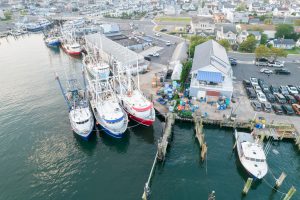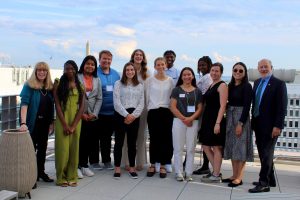Applications due January 29th, 2021, 3PM ET
A research training opportunity is available at the Environmental Protection Agency (EPA), Office of Research and Development (ORD), Center for Public Health and Environmental Assessment (CPHEA), Pacific Ecological Systems Division (PESD) in Newport, Oregon. The research participant will participate in a research project focused on assessing the role of land-based drivers of coastal acidification in estuaries of the United States. The project will utilize existing and novel biogeochemical, spatial, and model data to evaluate the patterns and trends of estuarine acidification in estuaries around the U.S. This research project will help inform a vulnerability assessment of U.S. estuaries to land-based sources of acidification, including the roles of eutrophication and land use change. Activities that the research participant may be involved in include:
- Field activities including sampling streams and estuaries for water chemistry, and servicing water quality instrumentation.
- Compiling and analyzing datasets of stream and estuarine water quality (including nutrients, pH, alkalinity, and stable isotopes), land use, and other relevant indicators of land-based sources of acidification.
- Compiling scientific literature relevant to the project.
- Collaborating with government and academic researchers to help develop hydrodynamic and biogeochemical models of coastal and estuarine systems.
- Contributing to scientific manuscripts and presentations on this research project, including opportunities for presenting at scientific conferences.
Applications are due January 29, 2021 at 3:00pm ET.
Details here: https://zintellect.com/Opportunity/Details/EPA-ORD-CPHEA-PESD-2020-05
Learning Objectives: The research participant will have the opportunity to gain knowledge by collaborating with a multidisciplinary team of EPA researchers. Through regular interactions with this team, the research participant will gain experience with conducting field work and maintaining water quality monitoring instrumentation, collecting water quality samples, analyzing samples, compiling and analyzing large datasets, laboratory management, following quality assurance protocols, and preparing reports and presentations. The research participant will have an opportunity to communicate their findings through publication of manuscripts and participation in scientific conferences. The research participant is encouraged to collaborate on writing of manuscripts for publication and project reports.
Mentor(s): The mentor for this opportunity is Stephen Pacella (pacella.stephen@epa.gov). If you have questions about the nature of the research please contact the mentor(s).
Anticipated Appointment Start Date: February 2021. All start dates are flexible and vary depending on numerous factors. Click here for detailed information about start dates.
Appointment Length: The appointment will initially be for one year and may be renewed up to four additional years upon EPA recommendation and subject to availability of funding.
Level of Participation: The appointment is full-time.
Participant Stipend: The participant will receive a monthly stipend commensurate with educational level and experience. Click here for detailed information about full-time stipends.
EPA Security Clearance: Completion of a successful background investigation by the Office of Personnel Management (OPM) is required for an applicant to be on-boarded at EPA.
ORISE Information: This program, administered by ORAU through its contract with the U.S. Department of Energy (DOE) to manage the Oak Ridge Institute for Science and Education (ORISE), was established through an interagency agreement between DOE and EPA. Participants do not become employees of EPA, DOE or the program administrator, and there are no employment-related benefits. Proof of health insurance is required for participation in this program. Health insurance can be obtained through ORISE.
Questions: Please see the FAQ section of our website. After reading, if you have additional questions about the application process please email EPArpp@orau.org and include the reference code for this opportunity.





